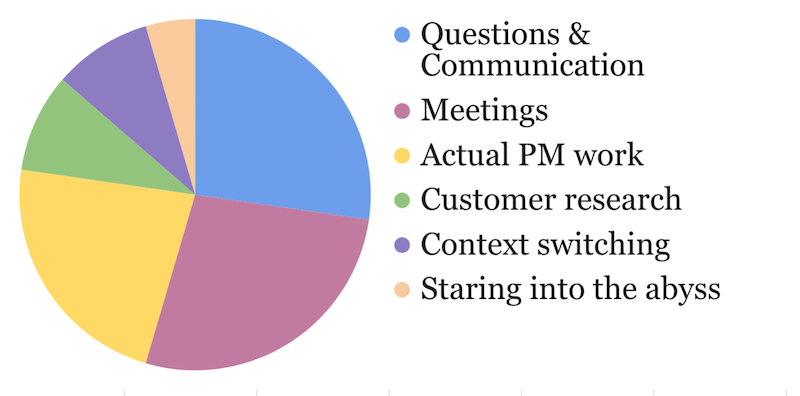What Everyone Failed to Mention about Being a PM in School
I came across this curriculum for product management the other day and had a bit of a chuckle.
Some of the things that it covers are:
- building case studies
- writing business plans segmented for each major function
- market planning
- competitive analysis
- project plans for each major activity
- product specs
- product launch plans
- product life cycle project modeling
- phase gate process modeling
- product/market data modeling
Ok, yes, product managers do a bunch of these, but it’s far from ordinary to only spend your time doing these tasks.
In fact, if you base what product management is like based on this list of skills you’ll need to acquire and assume that this is a majority of the job — I can promise you you’re in for a big surprise.
It’s not all rainbows, requirements, and roadmaps. It’s actually stakeholders, stress, and compromise.
Now, if you’re new here, I’m not trying to put you off from product management…I simply want to manage any expectations you have.
And if you’re an existing PM, welcome. We feel your pain. You’re not the only one who feels stuck doing a lot of other things that you never thought that you would have to do.
Rather than lead you on to think that product management is simply analysis, writing, and planning, we’re going to work on resetting expectations.
What PMs Spend Their Time On…For Real

30% - Communication
The first 30% chunk of your time is going to be spent answering questions and getting sidetracked, trying to find the answers to those questions.
These questions come from all over the place. Internal stakeholders, customers, teammates, sales, and marketing teams, you know, the list goes on.
It’s just, sometimes it feels like your email inbox or your Slack DM is just a never-ending treadmill that you can’t get off.
30% - Meetings
Another 30% of your time is going to be spent in meetings. And these meetings you may or may not be productive. It really depends.
A lot of them are going to be status meetings. Others are going to be a group of people trying to figure out the questions that I mentioned in the other section.
Others are going to be talking about how to get stakeholders on board, doing product management things, and serve as group therapy sessions.
Between communication and meetings, there goes 60% of your time.
25% - Product Management Work
About a quarter of your time is actually going to be spent on the product management work that we covered before.
This is things like writing specs, testing, new releases, updating the roadmap, checking schedules, making go to market plans, and all that other fun stuff that…you know…you thought product management was about.
10% - Talking to Customers
Another 10% is going to be talking to customers and doing market research.
Obviously we all wish that this was a larger chunk, but 10% is probably the bare minimum here.
10% - Context Switching
Another 10% gets lost to context switching, prepping for meetings, dabbling in software, and trying to finagle it to get it to what you want to do.
5% - Questioning Your Life Choices
The last 5% is you staring into the abyss, wondering why you work so much.
Not every PM…
This breakdown isn’t representative of every product manager. There are plenty of product managers out there who have figured out how to flip the script and spend more time doing customer research and actual PM work and less time answering questions and taking meetings.
And you can definitely work hard to flip this.
One great way to start the process is to ask yourself every day…
What proactive thing can you do today to avoid that next message in your DMs?
That’s a great way to start whittling down the questions and communications and meetings you need to partake in.
Product Management is a Great Career, Just Go Into It With Open Eyes
Overall, product management in real life is not exactly what you’re taught in a product management certification, and I’m not dissing product management certifications. I think that they are really great and really help you learn the mechanics of some of this stuff, but a lot of your success as a product manager is going to be based on your own ability to communicate well under stress.
